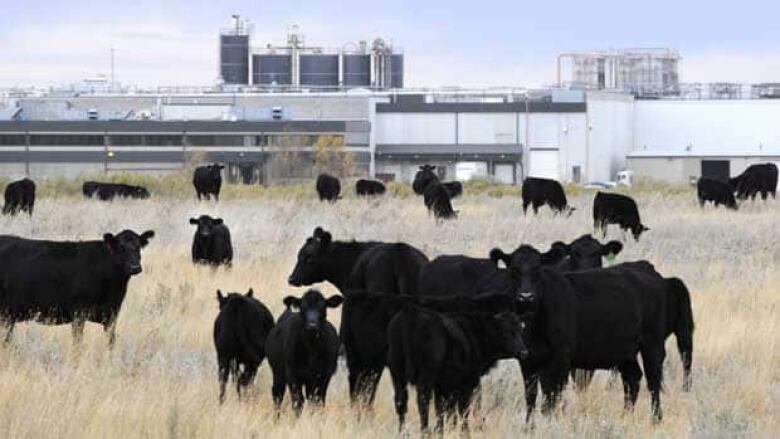XL Foods warned 6 times over lapses before E. coli outbreak
Correction Action Requests issued at Alberta plant for sanitation, contamination

An Alberta meat-processing plant at the centre of Canada's largest beef recall was ordered to address serious problems six times in the months leading up to an E. coli outbreak last summer, documents obtained by CBC News show.
The issues identified by Canadian Food Inspection Agency inspectors at the Brooks plant, known as Establishment 38, included:
- Failure to sanitize cutting tools and workspaces.
- Improper labelling.
- Mixing of edible and inedible parts of carcasses.
- Lapses in building maintenance that saw condensation from pipes dripping onto carcasses.
The details are contained in six Corrective Action Requests (CARs) and followup reportsobtained by CBC News under Access to Information requests.
The XL Foods plant's licence was suspended on Sept. 27 because of concerns about E. coli contamination and deficiencies identified by the CFIA at the facility.
The suspension came weeks after an alert was issued by U.S. inspectorswho discovered the presence of E. coliin a shipment of beef from XL Foods. At least 18 people were made ill from meat traced to the plant, and a recall expanded to more than 1,500 products while tonnes of beef from the plant had to be destroyed.
CARs are issued by CFIA inspectors in a plant when a formal response is required from the company "to ensure changes that are needed to be taken to allow the facility to be in compliance with the various federal acts and regulations are completed," according to the CFIA.
An in-depth investigation carried out after the detection of E. coli in September resulted in six more CARs being issued and completed before the plant was allowed to open in late October.
But the CARs released Monday show problems had been identified at the plant months earlier.
A CAR issued on Feb. 14cited improper building maintenance, including ablast freezer door that did not properly close, exposed insulation, a missing seal on a washroom door and other violations, while also noting that earlier work orders issued to fix some of the problems had not been carried out. A month later, following an extension, a followup report found the issues had been addressed. The serial number for this CARsuggests the concerns dated to 2011.
5 more CARs issued
After that, starting in May, five more CARs were issued, mostly due to violations of sanitation and operational procedures. These included:
- A May 5 inspection that found "cows and bulls dragging on equipment wash platform" in around the pre-break room, improper sanitation of thesaw used to cut the necks of the animals, "necks and shanks" pulled over buckets of inedible byproducts, use of unlabelled sanitary spray bottles and contamination of carcasses. Followup inspections found continued problems.
- A June7 inspection that found poor monitoring of product labelling, and missing labels and paperwork for pallets and boxes of meat.
- A June 26 inspection that found workers were not properly washing cutting tools and hooks while cutting carcasses, and not cleaning contaminated carcasses before cutting them. The report says production was stopped for three minutes while "team members were removed and retrained before continuing." Another employee who was not sanitizing a knife between cuts through a hide was "removed and replaced."
- An Aug. 7 CAR reportingproduction was stopped for 35 minutes and 315 carcasses held back"for water dripping on carcasses" in the carcass-cooling room from "condensation formed and dripping from rails, pipes, refer drip pans and structure." In a followup inspection three days later, the CFIA inspector identified "plastic (sic) overflowing with unsanitary water and condensation dripping from rails/structures" in the killing room, and "initiated action to hold 765 carcasses from start of production until time of incident."
- An Aug. 20 inspectionthat raised concerns about employees' sanitation practices and sanitary conditions on cutting tools, computers, cutting boards, trim stations and floor areas.
CARs were 'effectively addressed,' CFIA says
The CFIA reports list both immediate actions taken by inspectors and followup plans to meet the corrective actions.
The followup reports indicate each of the CARs were closed within a week to five weeks of the orders being issued, and most involved retraining and interviewing of employees to ensure they understood proper sanitation and operational procedures.
In a statement issued Tuesday, the CFIA said "all of these CARs were effectively addressed by the company and were closed within the time-frame required by the CFIA."
"CFIA inspectors are in constant communication with plant management throughout the production day at federally registered meat establishments. When an inspector observes a potential issue of concern, they inform plant management," the statement said.
The XL Foods plantwas allowed to reopen Oct. 23under enhanced surveillance and increased testing protocols, with more than 46 CFIA inspectors assigned to monitor slaughter procedures.
JBS, the companythat runs theXL Foods plant, said it had no comment becausethese issues came up before it tookover the management of the plant in mid-October.
Looking over the documents, beef expert Ted Haney said heisn't surprised.
"There's no such thing as zero risk, there's no such thing as perfection," he said. "It was reported, which is good, which means it was acted upon."












_(720p).jpg)


 OFFICIAL HD MUSIC VIDEO.jpg)
.jpg)



























































































